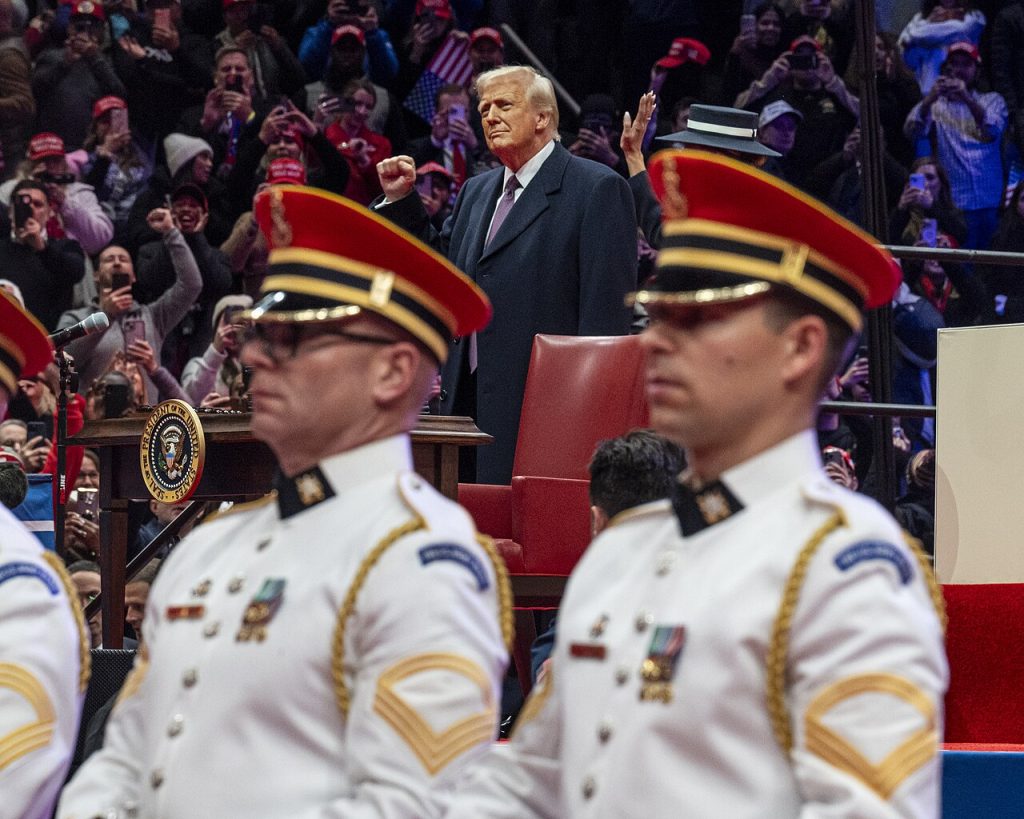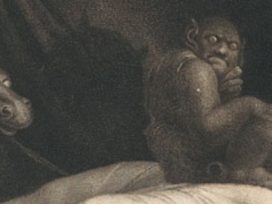Global media coverage of Trump’s inaugural parade at the Capital One Arena in Washington, DC focused on one episode alone: the raised hand of the world’s richest man. Opinions were divided on the meaning of Musk’s gesture. While the Israeli prime minister dismissed it as an involuntary spasm devoid of significance, others saw it as a sinister reference to fascist Italy or Nazi Germany.
Whether or not it was an intentional imitation of the infamous Roman salute, the incident again raised questions about Musk’s integrity. After all, anyone with minimal knowledge of the history of the twentieth century should think twice before sticking their right hand into the air.
Aside from the Musk controversy, the inauguration parade provoked little in terms of analysis. The fact that it was an important and innovative political spectacle of Trumpism, aimed at revising traditional inauguration proceedings, went largely unnoticed.
While the ceremony in the Capitol Rotunda adhered to established protocol, and was attended by former US presidents (despite their displeasure), the parade at the Capital One Arena was unprecedented.

Image: Staff Sgt. Danny Gonzalez / Source: United States Department of Defense and Wikimedia Commons
The show was arranged after the cold weather prevented MAGA supporters gathered in the nation’s capital from attending the inauguration. But even considering the meteorological explanation for the Capital One Arena event, it is essential to understand its broader significance.
Worst-case scenarios
Between 1995 and 2000, Richard Wortman, a respected American historian of the Russian Empire, published a two-volume work entitled Scenarios of Power: Myth and Ceremony in Russian Monarchy. Wortman’s groundbreaking research examined the ceremonies of the Tsars as an instrument for the exercise of absolute power. But Wortmann’s concept of ‘scenarios of power’ need not be limited to imperial Russia, nor to empires. We can also ask how the scenarios of power in authoritarian states like Russia and China compare to those in Trump’s America.
The Russian president Vladimir Putin has undergone no fewer than five inaugurations. These have marked a complete departure from Soviet practice, when the General Secretary of the Communist Party was elected at party congresses. Back then, Soviet leaders needed to convince the population and the rest of the world, as well as themselves, that they were oriented toward the future. In 1961, under the orders of Nikita Khrushchev, the faceless, modern Palace of Congresses was constructed inside the Kremlin. The only decoration was a gigantic red banner hung behind the stage, complemented by an oversized statue (or portrait) of Lenin.
Boris Yeltsin was inaugurated twice in the same building, later renamed the State Kremlin Palace. Both occasions were brief. On the second, the red banner and images of Lenin had disappeared. The patriarch of the Russian Orthodox Church took part instead, despite the constitution’s separation of Church and State.
Under Putin’s reign, the inauguration ceremony changed again. Reflecting the imperial nostalgia of the new Russian ruler, it was moved to the old Grand Kremlin Palace, constructed in 1849 and rich with gilded interior decorations. Honour guards in Napoleonic-era uniforms were introduced, as was a festive prayer service led by the Patriarch of Moscow and all Rus. The national anthem of the Russian Federation – a revamped version of the Stalinist original, with new lyrics replacing Lenin’s name with God’s – was complemented by a performance of ‘Glory’, the epilogue of Mikhail Glinka’s opera A Life for the Tsar. Transforming the inauguration into an ersatz coronation, the spectacle’s anonymous directors created a mashup of national-historical stereotypes. The result resembled a surreal restaging of Tchaikovsky’s Nutcracker, with guards dressed like the prince dancing around the ‘Mouse King’ – the newly elected president of the Russian Federation.
Unlike the Russians, the Chinese do not glorify their imperial past by re-staging the ceremonies of the court of Empress Dowager Cixi. Instead, they remain devoted to the Soviet-style party congresses that Chairman Mao borrowed from Stalin. While post-Soviet Russia pretends to be imperial, capitalist China pretends to be communist. The decoration of the Great Hall of the People that dominates Tiananmen Square is minimal, reduced to a backdrop of gigantic red banners. The musical accompaniment is limited to the anthem, sung by the delegates. Devotion to tradition is meant to create an illusion of stability in power, regardless of the changes it may undergo.
Markers of power
The Capital One Arena is, alas, neither the Grand Kremlin Palace nor the Great Hall of the People. If the ceremony unexpectedly alluded to a distant imperial past, it was instead due to the actions of President Trump.
From the outset, the event had the character of a ‘poor man’s inauguration’, a carnival version of the official ceremony with all the solemnity of a provincial campaign rally. Not even the antics of Musk could warrant its comparison with a Reichsparteitag. That the American musical canon lacks marches of German or Russian calibre was impossible to ignore; if anything, the interminable brass band music created the atmosphere of a circus. The only difference was that in the Capital One Arena, the audience was kept waiting for hours for the appearance of the wild predators.
The parade itself, featuring school cheerleaders and overweight policemen, was no match for the one Trump had seen in Paris on Bastille Day during his first presidency and had wanted to replicate (it turned out to be too expensive). However, with one act, the president – who appeared visibly bored – managed to transform the Barnum Circus into a Circus Maximus. Despite being a far more telling gesture than Musk’s salute, it attracted very little comment.
After theatrically signing a series of executive orders, Trump began throwing Sharpie markers into the audience, watching with undisguised pleasure as his followers fought over the presidential souvenirs. Especially produced for signing documents and adorned with Trump’s signature in gold, these felt-tips have become a symbol of his larger-than-life persona. The president obviously needs his signature to be visible from a distance and can’t rely on Montblanc fountain pens, the utensil of choice for most world leaders.
At this moment the democratically elected leader of the most powerful country in the world was acting like a Roman emperor. In ancient Rome, the tradition of congiarium – throwing coins to the plebs – took various forms. The historian Cassius Dio wrote that ‘Nero would throw among the crowd tiny balls, each one appropriately inscribed, and the articles called for by the balls would be presented to those who had seized them’. The imperial biographer Suetonius described how Caligula ‘scattered large sums of money among the commons from the roof of the basilica Julia for several days in succession’. The emperor Elagabalus – another notorious decadent remembered as the inventor of rose-petal orgies – was known to throw pieces of gold and silver into the crowd.
Even if the gifts Trump scattered amongst his audience at the Capital One Arena sell for between $1 and $2.50 a piece, the comparison is striking. It is difficult to imagine that the neo-imperial gesture of the POTUS was scripted in advance. Most likely, it was a genuine demonstration of his feelings towards his supporters. This should not reassure us. Even more than Musk’s ‘Roman salute’, it is the congiarium of Trump that indicates the Republic is in peril.







